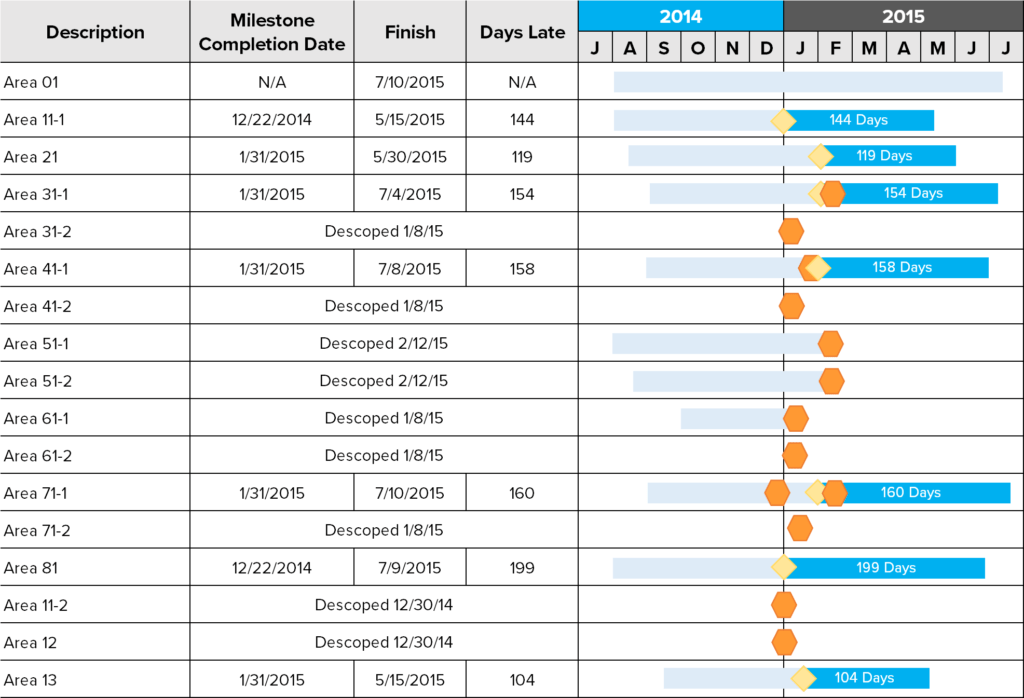Project
- 800,000 SF Steel Manufacturing Plant
- $975MM Total Project Cost
Subcontract
- $20MM Lump Sum Turnkey
Primary Issues
Dispute
A global metals manufacturer—based in Europe—engaged a European contractor to provide engineering and construction services for a new manufacturing plant to be located in the United States. A U.S.-based mechanical contractor received a subcontract for work scope related to mechanical, pipe, and equipment work.
Throughout the project, the mechanical subcontractor claimed it encountered multiple challenges during the execution of its work, resulting in additional costs beyond those accounted for in the lump-sum contract. Among the challenges the mechanical subcontractor alleged were shortages in the local labor pool, ineffective change management practices, delays to the project schedule, miscellaneous cost overruns, and late/out-of-sequence receipt of equipment. The U.S. subcontractor also alleged that the engineering and construction management practices of the European contractor were not in line with standard industry practices encountered in the U.S.
The contractor rejected the subcontractor’s claims for compensation beyond the lump-sum contract amount, stating that any additional costs incurred by the subcontractor were a direct result of the subcontractor’s own management of its scope of work.
Approach
Counsel for the contractor retained GlassRatner to analyze the issues and claimed damages related to construction management, labor productivity, schedule delay, and outstanding payment issues.
Labor Productivity Analysis
GlassRatner investigated the subcontractor’s allegations of lost labor productivity, assessing the accuracy and validity of the measured mile, MCAA Factors, and earned value methodologies used to quantify the alleged labor productivity losses. GlassRatner developed a timeline of events/issues that contributed to labor productivity losses and determined the root causes through analyses of contemporaneous project documents. Ultimately, GlassRatner found flaws in the subcontractor’s labor productivity calculations and determined the lost labor productivity was a result of the subcontractor’s mismanagement of its labor force, mishandling of onsite material/equipment, and substandard workmanship.
CPM Schedule Analysis
Based on the baseline schedule and periodic schedule updates, GlassRatner divided the project into discrete time periods, or “windows.” Within each window, GlassRatner analyzed the project critical path to determine the total delay experienced during the corresponding time period. GlassRatner then analyzed contemporaneous project documents to determine the root causes for each delay and allocated the delay days to the responsible party. Based on this analysis, GlassRatner determined that the subcontractor’s inefficient labor, lag between material procurement and construction, and rework due to poor workmanship were the primary contributors to the critical path delays. GlassRatner also identified delays due to the contractor supplying material and equipment; however, these procurement delays were largely concurrent with the subcontractor-caused delays, which were not assessed against either party.
Outcome
Expert Testimony
GlassRatner provided expert testimony at deposition; later, GlassRatner once again provided expert testimony during the arbitration hearing. GlassRatner’s expert testimony primarily pertained to the root causes of the labor productivity losses and schedule delays, as well as the validity of the outstanding contract invoices.
Judgement
The arbitration panel issued a “reasoned decision,” which required GlassRatner’s client, the contractor, to pay the subcontractor only for acceptable work performed under the contract included in the valid invoices. The arbitration panel denied the subcontractor’s claims for damages related to lost labor productivity and schedule delays.


